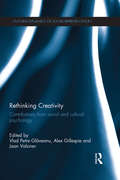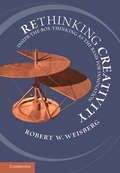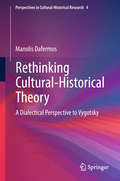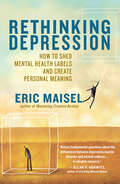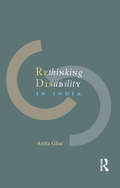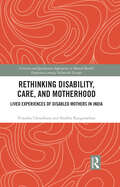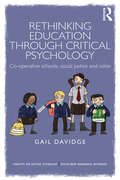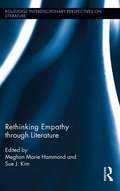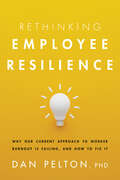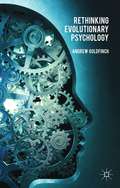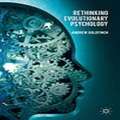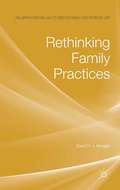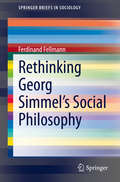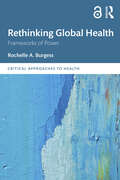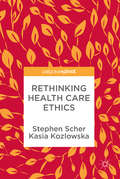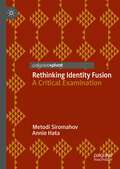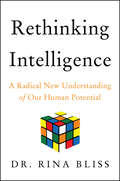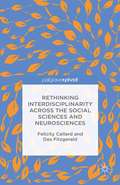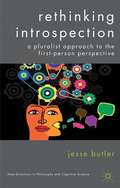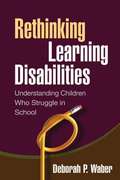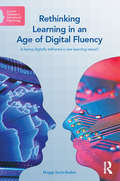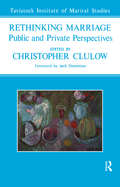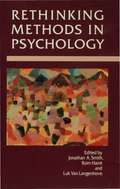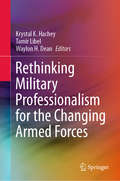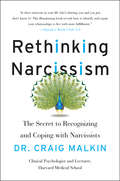- Table View
- List View
Rethinking Creativity: Contributions from social and cultural psychology (Cultural Dynamics of Social Representation)
by Jaan Valsiner Vlad Petre Glăveanu Alex GillespieDespite more than half a century of psychological research on creativity we are still far from a clear understanding of the creative process, its antecedents and consequences and, most of all, the ways in which we can effectively support creativity. This is primarily due to a narrow focus on creative individuals isolated from culture and society. Rethinking Creativity proposes a fundamental review of this position and argues that creativity is not only a psychological but a sociocultural phenomenon. This edited volume aims to relocate creativity from inside individual minds to the material, symbolic and social world of culture. It brings together eminent social and cultural psychologists who study dynamic, transformative and emergent phenomena, and invites them to conceptualise creativity in ways that depart from mainstream definitions and theoretical models existing in past and present literature on the topic. Chapters include reflections on the relationship between creativity and difference, creativity as a process of symbolic transformation, the role of apprenticeships and collaboration, the importance of considering materiality and affordances in creative work, and the power of imagination to construct individual trajectories. The diverse contributions included in this book offer readers multiple pathways into the intricate relationship between mind, culture, and creativity, and invite them to rethink these phenomena in ways that foster creative action within their own life and the lives of those around them. It will be of key interest to both social and cultural psychologists, as well as to creativity researchers and those who, as part of their personal or professional life, try to understand creativity and develop creative forms of expression.
Rethinking Creativity: Inside-the-Box Thinking as the Basis for Innovation
by Robert W. WeisbergThis book presents a new perspective on creativity: that creative innovation depends on inside-of-the-box thinking. Not outside the box, as we all believed. It shows that creativity builds on what we know and how we use old ideas to produce new ones. In a highly readable format, Robert W. Weisberg uses case studies of seminal creative advances, such as Leonardo's 'Aerial Screw' and Frank Lloyd Wright's 'Falling water' house. These fascinating examples are evaluated alongside cutting-edge research to present an analysis of creativity that challenges us to think differently about this intriguing cognitive ability.
Rethinking Cultural-Historical Theory: A Dialectical Perspective To Vygotsky (Perspectives In Cultural-historical Research Ser. #4)
by Manolis DafermosThis book is an exploration of science in the making. It offers readers the opportunity to critically reflect on the process of development of Vygotsky's research program from the perspective of dialectics, focusing on the dramatic process of building and rebuilding cultural historical theory. Vygotsky's creative and dramatic journey is no less important than the concrete results of his research. An epistemological and historical investigation of the formulation of cultural historical theory sheds light on the process of knowledge production and reveals hidden dimensions of creativity in science.
Rethinking Depression: How to Shed Mental Health Labels and Create Personal Meaning
by Eric MaiselIn this provocative and pathbreaking distillation of a career spent working with individuals seeking help with mood and motivation, Eric Maisel reveals the implications of one of the most dramatic cultural shifts of our time. In recent decades, much of the unhappiness inherent in the human condition has been monetized and labeled as the disease of depression and related “disorders.” Maisel persuasively critiques this sickness model and prescribes a potent new therapy. The existential cognitive-behavioral therapy (ECBT) he details here marries the proven methods of CBT with the powerful meaning-based orientation of existential therapy. The result is a revolutionary reimagining of life’s difficulties and a liberating model of self-care that optimizes the innate human ability to create meaning and seize opportunity — in any circumstance.
Rethinking Disability in India
by Anita GhaiMoving away from clinical, medical or therapeutic perspectives on disability, this book explores disability in India as a social, cultural and political phenomenon, arguing that this `difference' should be accepted as a part of social diversity. It further interrogates the multiple issues of identification of the disabled and the forms of oppressio
Rethinking Disability, Care, and Motherhood: Lived Experiences of Disabled Mothers in India (Critical and Qualitative Approaches to Mental Health Experiences among Vulnerable Groups)
by Priyasha Choudhary Shubha RanganathanThis book focuses on the lived realities of disabled mothers to examine how they navigate their multiple competing responsibilities and identities. It reimagines normative constructions of motherhood, dependency, and care while rethinking advocacy and resistance, in the context of disability, gender, and mental health. It essentially argues that disabled women negotiate a delicate balancing act: they constantly work at proving their competence, even as they push the boundaries of normative femininity.The book is grounded in qualitative research on disabled mothers. In these conversations, disabled mothers described various aspects of their motherhood journey, ranging from their interactions with society to their daily experiences within the household. Drawing from critical disability studies, critical psychology, care theory, and feminist scholarship, this interdisciplinary volume elaborates on the everyday situations that disabled mothers encounter and the strategies they engage in to provide care for their children.This book will be relevant for students and scholars in disability studies, psychology, gender studies, development studies, medical anthropology and sociology, and medical humanities, among others. Further, the use of case studies makes it an essential read for practitioners and policymakers. Recognising the political significance of ‘plain language’ in disability studies, the book’s accessible language will appeal to academic, lay, and practitioner audiences.
Rethinking Education through Critical Psychology: Cooperative schools, social justice and voice (Concepts for Critical Psychology)
by Gail DavidgeSince the very first ‘co-operative’ school opened its doors in 2008, the complicated relations between ‘co-operative’ approaches to schooling and democratic subjectivity remain unexplored. This ground breaking book considers the role of ‘voice’ in co-operative schooling and its place in radical research, offering an original, critical analysis of an alternative model of ‘co-operative’ schooling set within the context of the contemporary public education sector in England. Drawing on post structural theory and critical ethnographic research, the author explores how this model might offer new ways of thinking about what education is for and who stands to benefit or lose when schools adopt co-operative ways of working together across the structures of governance, pedagogy and curriculum. The book considers how participatory ways of working in education might inform a more critical educational psychology that takes engendering equality and collective well-being as an alternative starting point to measuring individual achievement and cognitive development. This text will appeal to advanced level undergraduate and postgraduate students, researchers and practitioners, particularly in the field of psychology, education, politics and social research, with an interest in developing a critical appreciation of inequalities in education and in reimagining the possibilities for change.
Rethinking Empathy through Literature (Routledge Interdisciplinary Perspectives on Literature)
by Sue J. Kim Meghan Marie HammondIn recent years, a growing field of empathy studies has started to emerge from several academic disciplines, including neuroscience, social psychology, and philosophy. Because literature plays a central role in discussions of empathy across disciplines, reconsidering how literature relates to "feeling with" others is key to rethinking empathy conceptually. This collection challenges common understandings of empathy, asking readers to question what it is, how it works, and who is capable of performing it. The authors reveal the exciting research on empathy that is currently emerging from literary studies while also making productive connections to other areas of study such as psychology and neurobiology. While literature has been central to discussions of empathy in divergent disciplines, the ways in which literature is often thought to relate to empathy can be simplistic and/or problematic. The basic yet popular postulation that reading literature necessarily produces empathy and pro-social moral behavior greatly underestimates the complexity of reading, literature, empathy, morality, and society. Even if empathy were a simple neurological process, we would still have to differentiate the many possible kinds of empathy in relation to different forms of art. All the complexities of literary and cultural studies have still to be brought to bear to truly understand the dynamics of literature and empathy.
Rethinking Employee Resilience: Why Our Current Approach to Worker Burnout is Failing, and How to Fix It
by Dan PeltonRethinking Employee Resilience is a practical, evidence-based guide to creating workplaces that invest in their workforce - the backbone of every organization. In an era of institutional collapse, workforce resilience isn&’t a luxury; it&’s non-negotiable. Burnout has quietly become the new normal. As trust in institutions crumbles and career stability feels like a relic of the past, organizations face a choice: cling to outdated models or redefine their cultures to prioritize human resilience. This book challenges the self-help industry&’s one-size-fits-all narrative, reframing burnout as a systemic issue embedded within organizational culture. It unfolds in three parts: debunking common burnout myths, redefining employee resilience, and offering tailored &‘on-ramps&’ for organizations of all sizes. Drawing from his work as a clinical psychologist in Afghanistan, where he provided mental health care to thousands of soldiers, to a decade leading mental health initiatives in management consulting, Dr. Dan Pelton has seen how burnout takes root—and knows how to dismantle it.Rethinking Employee Resilience isn&’t just another leadership manual filled with hollow platitudes. This book rejects the status quo — an unconventional guide for leaders and employees to transform organizational culture, grounded in empirical research, industry insights, and real-world experience.
Rethinking Evolutionary Psychology
by A. GoldfinchRethinking Evolutionary Psychology identifies, champions and vindicates a streamlined evolutionary psychology. It offers a new way of thinking that moves decisively away from theoretical and critical excess. Where standard accounts often obscure and distort, this book emphasizes and develops evolutionary psychology's heuristic credentials.
Rethinking Evolutionary Psychology
by Andrew GoldfinchIn Rethinking Evolutionary Psychology, Andrew Goldfinch dramatically reframes the way we think about evolutionary psychology. Rather than follow the standard way of thinking about evolutionary psychology as a paradigm and a pretender metatheory of the evolutionary behavioural sciences, Goldfinch argues that evolutionary psychology is better thought of as a heuristic research programme within the evolutionary behavioural sciences. Elucidating evolutionary psychology as a heuristic illuminates those aspects of adaptationist methodology in psychology that deserve serious attention. It reveals evolutionary psychology to be a unique set of concepts, research strategies and recipes for generating new and bold discoveries in psychology; a searchlight that can identify and chart plausible and unexplored research trajectories; a constrained yet creative way to win new facts that would otherwise be lost to the infinite space of random trial and error.
Rethinking Family Practices (Palgrave Macmillan Studies in Family and Intimate Life)
by D. MorganLeading family sociologist David Morgan revisits his highly influential 'family practices' approach in this new book. Exploring its impact, and how it has been critiqued, Morgan shows the continued relevance of the approach with reference to time and space, the body, emotions, ethics and work/life balance.
Rethinking Georg Simmel's Social Philosophy (SpringerBriefs in Sociology)
by Ferdinand FellmannThis textbook examines interaction, reciprocity, dualism, conflict, and personality in the work of Georg Simmel. These themes, which made Simmel the founder of relational sociology, are presented uniquely in the light of intimate relations. According to Simmel, intimate relations rather than the individual constitute the fundamental stratum of human culture. By relating objective social facts to subjective experience, Simmel also opened up a new way of understanding human life in the early 20th century. Using Simmel’s theory of reciprocity, this book follows an innovative method of interpretation, providing a quantitative perspective of lived experience. This book analyzes Simmel’s ideas from the viewpoint of modern hermeneutical philosophy and sociology. Fellmann expertly presents the historical context of Simmel’s concepts, and their influence on other sociologists and philosophers, especially in Germany. Written in an engaging style, this book is suitable as a core text in undergraduate and graduate courses on sociological theory and continental philosophy. Additionally, given the new focus on Simmel and intimate relations, the book is of interest to scholars of relational sociology, history of sociology, continental philosophy, history of philosophy, philosophy of culture, and philosophical anthropology.
Rethinking Global Health: Frameworks of Power (Critical Approaches to Health)
by Rochelle A. BurgessThis book reflects and analyses the working of power in the field of global health– and what this goes on to produce. In so doing, Rethinking Global Health asks the pivotal questions of, ‘who is global health for’ and ‘what is it that limits our ability to build responses that meet people where they are?’ Covering a wide range of topics from global mental health to Ebola, this book combines power analyses with interviews and personal reflections spanning the author’s decade-long career in global health. It interrogates how the search for global solutions can often end up far from where we anticipated. It also introduces readers to different frameworks for power analyses in the field, including an adaptation of the ‘matrix of domination’ for global health practice. Through this work, Dr Burgess develops a new model of Transformative Global Health, a framework that calls researchers and practitioners to adopt new orienting principles, placing community interests and voices at the heart of global health planning and solutions at all times. This book will be beneficial to students and academics working in the global and public health landscape. It will also hold appeal to activists, practitioners and individuals invested in the discipline and in health equity around the world.
Rethinking Health Care Ethics
by Stephen Scher Kasia KozlowskaThe goal of this open access book is to develop an approach to clinical health care ethics that is more accessible to, and usable by, health professionals than the now-dominant approaches that focus, for example, on the application of ethical principles. The book elaborates the view that health professionals have the emotional and intellectual resources to discuss and address ethical issues in clinical health care without needing to rely on the expertise of bioethicists. The early chapters review the history of bioethics and explain how academics from outside health care came to dominate the field of health care ethics, both in professional schools and in clinical health care. The middle chapters elaborate a series of concepts, drawn from philosophy and the social sciences, that set the stage for developing a framework that builds upon the individual moral experience of health professionals, that explains the discontinuities between the demands of bioethics and the experience and perceptions of health professionals, and that enables the articulation of a full theory of clinical ethics with clinicians themselves as the foundation. Against that background, the first of three chapters on professional education presents a general framework for teaching clinical ethics; the second discusses how to integrate ethics into formal health care curricula; and the third addresses the opportunities for teaching available in clinical settings. The final chapter, "Empowering Clinicians", brings together the various dimensions of the argument and anticipates potential questions about the framework developed in earlier chapters.
Rethinking Identity Fusion: A Critical Examination
by Metodi Siromahov Annie HataRethinking Identity Fusion presents a critique of Identity Fusion Theory, an identity-based social psychological approach to understanding pro-group extremism. It scrutinises the theory’s main theoretical claims and research methods, exposing serious inconsistencies and gaps in how the theory handles the concept of identity and in its research programme. The book demonstrates the flattening of the theory’s main concept, “identity fusion”, and the general state of confusion in the recent literature as to the theory’s claims and predictions.The book offers a reinterpretation of Identity Fusion Theory through a discursive perspective, critiquing its cognitivist assumptions about the nature of human relationships and identity. In this way, its scope extends to wider critiques of experimental and quantitative methods in contemporary social psychology. It argues that such theoretical and methodological shortcomings, rather than hindering a flawed approach, can accelerate its adoption in social psychology by creating an image of theoretical unity and consistency on top of a field characterised by confusion and contradiction.
Rethinking Intelligence: A Radical New Understanding of Our Human Potential
by Rina BlissA genetics expert and professor challenges our understanding of intelligence, explaining what it truly means to be “smart,” why conventional assessments are misleading, and what everyone can do to optimize their potential.Growing up in middle-class suburban Los Angeles in the 1980s, Rina Bliss was saw intelligence as her ticket out. Like height and stature, intelligence was said to run in families. The prevailing idea was that mental capacity was determined by our DNA and could be measured; a simple IQ test could predict a child’s future.Yet, once Dr. Bliss looked closer, first as a student, then as a scientist, and later as a mom of identical twins who share a genome, she began to challenge conventional wisdom about innate intelligence. In Rethinking Intelligence, she shares her findings, drawing on cutting-edge scientific research to offer a new model for how we understand, define, and assess intelligence, using a measurement that is far more flexible and expansive.Intelligence has little to do with standardized test results or other conventional measures of intellect, Dr. Bliss argues. Intelligence is a process, a journey defined by change that cannot be scored or taken away. Intelligence is influenced by our surroundings in ways that are often overlooked—more than Baby Mozart or flash cards or superfoods, factors like stress, connection, and play actually sculpt young minds.In Rethinking Intelligence, Dr. Bliss shares insights from the burgeoning science of epigenetics to help us harness our environments to empower our minds. If we truly want to nurture potential, we must eliminate toxic stress so that our genes can work optimally, in harmony with our environment. Dr. Bliss offers successful strategies we can use as individuals and a society, including embracing a growth mindset, prioritizing connection, becoming more mindful, and reforming systemic issues—poverty, racism, the lack of quality early childhood education—that have a negative and lasting neurobiological impact.Joining acclaimed works by Carol Dweck, Amy Cuddy, and James Clear, Rethinking Intelligence reframes human behavior and intellect, offering a new perspective for understanding ourselves and our children, and the practical tools necessary to thrive.
Rethinking Interdisciplinarity across the Social Sciences and Neurosciences
by F. Callard D. FitzgeraldThis book offers a provocative account of interdisciplinary research across the neurosciences, social sciences and humanities. Rooting itself in the authors' own experiences, the book establishes a radical agenda for collaboration across these disciplines. This book is open access under a CC-BY license.
Rethinking Introspection
by Jesse ButlerWe seem to have private privileged access to our own minds through introspection, but what exactly does this involve? Do we somehow literally perceive our own minds, as the common idea of a 'mind's eye' suggests, or are there other processes at work in our ability to know our own minds? Rethinking Introspection offers a new pluralist framework for understanding the nature, scope, and limits of introspection. The book argues that, contrary to common misconceptions, introspection does not consist of a single mechanism but rather a diverse range of mental states and cognitive processes with a broad spectrum of epistemic properties. Building upon this revised conception of introspection, the book illustrates and analyzes the variety of ways in which we introspectively grasp the contents of our own minds, from the immediate phenomenal knowledge generated by conscious experience to the self-deceptive possibilities enabled by certain kinds of inner speech.
Rethinking Learning Disabilities: Understanding Children Who Struggle in School
by Deborah WaberExperts have yet to reach consensus about what a learning disability is, how to determine if a child has one, and what to do about it. Leading researcher and clinician Deborah Waber offers an alternative to the prevailing view of learning disability as a problem contained within the child. Instead, she shows how learning difficulties are best understood as a function of the developmental interaction between the child and the world. Integrating findings from education, developmental psychology, and cognitive neuroscience, she offers a novel approach with direct practical implications. Detailed real-world case studies illustrate how this approach can promote positive outcomes for children who struggle in school.
Rethinking Learning in an Age of Digital Fluency: Is being digitally tethered a new learning nexus? (Current Debates in Educational Psychology)
by Maggi Savin-Baden"This is a book that I am going to have to own, and will work to find contexts in which to recommend. It cuts obliquely through so many important domains of evidence and scholarship that it cannot but be a valuable stimulus" -Hamish Macleod, University of Edinburgh Digital connectivity is a phenomenon of the 21st century and while many have debated its impact on society, few have researched relationship between the changes taking place and the actual impact on learning. Rethinking Learning in an Age of Digital Fluency examines what kind of impact an increasingly connected environment is having on learning and what kind of culture it is creating within learning settings. Engagement with digital media and navigating through digital spaces with ease is something that many young people appear to do well, although the tangible benefits of this are unclear. This book, therefore, will present an overview of current research and practice in the area of digital tethering, whilst examining how it could be used to harness new learning and engagement practices that are fit for the modern age. Questions that the book also addresses include: Is being digital tethered a new learning nexus? Are social networking sites spaces for co-production of knowledge and spaces of inclusive learning? Are students who are digitally tethered creating new learning maps and pedagogies? Does digital tethering enable students to use digital media to create new learning spaces? This fascinating and at times controversial text engages with numerous aspects of digital learning amongst undergraduate students including mobile learning, individual and collaborative learning, viral networking, self-publication and identity dissemination. It will be of enormous interest to researchers and students in education and educational psychology.
Rethinking Marriage: Public and Private Perspectives
by Christopher Clulow'This book brings together a group of specialists who attempt to describe the process of interaction between the inner and personal and the outer and social. They illustrate what is happening to current marriage, particularly in its daily intimate experience. They do not attmpt to offer expert solutions. They describe practice as they see it.'This book is a valuable study to help the clarification of the complex world of contemporary marriage, particularly as it stresses the dynamic aspects of the marital relationship which are the key to its present aspirations. It is a study which informs both the expert and the lay reader, helping to make sense of the necessary diverse realities which make up marriage today.'- from the Foreword by Jack Dominian.
Rethinking Methods in Psychology (Rethinking Psychology Ser.)
by Professor Rom Harre Professor Jonathan A Smith Luk Van LangenhoveThe recent widespread rejection of conventional theory and method has led to the evolution of different ways of gathering and analyzing data. This accessible textbook introduces key research methods that challenge psychology's traditional preoccupation with `scientific' experiments. The book provides a well-structured guide to methods, containing a range of qualitative approaches (for example, semi-structured interviews, grounded theory, discourse analysis) alongside a reworking of quantitative methods to suit contemporary psychological research. A number of chapters are also explicitly concerned with research as a dynamic interactive process. The internationally respected contributors steer the reader through the main stages of conducting a study using these methods.
Rethinking Military Professionalism for the Changing Armed Forces
by Waylon H. Dean Tamir Libel Krystal K. HacheyThis book will make a first contribution to identify the gaps in current practices and provide alternative mechanisms to conceptualize professionalism that is reflective of changing requirements, culture, and demographics of the contemporary military force.The military profession promotes the development, sustainment, and embodiment of ethos, which guides conduct across operational contexts, from times of national and international crises and security challenges (e.g., war, natural disasters, and peace support operations). It is imperative for military leaders to understand how ethos and doctrine shape professional frameworks, which guide the conduct of military members.
Rethinking Narcissism: The Bad---and Surprising Good---About Feeling Special
by Craig MalkinAre you a narcissist?"What is narcissism?" is one of the fastest-rising searches on Google, and articles on the topic routinely go viral. Yet the word "narcissism" seems to mean something different each time it's uttered. <P><P>In fact, the more it's slung about, the more elusive its true meaning becomes. The only certainty, it would seem, is that it's "bad" to be a narcissist--really bad. That's terrible news for millennials, who've been branded "the most narcissistic generation ever." <P>In Rethinking Narcissism, Dr. Craig Malkin--a Harvard Medical School Instructor and clinical psychologist with more than two decades of clinical experience--offers a radically new model for understanding this often misused term. <P>Narcissism, argues Dr. Malkin, is essentially a spectrum of self-importance--and everyone falls somewhere on the scale between utter selflessness and total arrogance. When we casually invoke the term "narcissist," most of us are referring to the outer edge of the spectrum, which can shade into dangerous psychopathy. <P>But there are also those who live at the lower end of the spectrum--dubbed "echoists" by Dr. Malkin. These, too, are people we know; people so fearful of attention or acknowledgment that they often seem to have no voice at all.Drawing on his own research as well as on the latest findings in psychology, Dr. Malkin uses vivid stories of people from all walks of life to teach concrete strategies for spotting--and coping with--excessive narcissism. <P>At the same time, he explains why embracing some degree of narcissism--the drive to feel special--is essential to maintaining a healthy sense of self-worth. Using his new tool, the Narcissism Test, he not only guides readers through the process of measuring their narcissism, but also offers step-by-step advice to prevent unhealthy narcissism and to nurture healthy narcissism--in ourselves as well as in our partners, our colleagues, and our children. <P>As practical as it is wise, Rethinking Narcissism doesn't just help people avoid the temptations and dangers of extreme narcissism--and narcissists--in both the real world and cyberspace; it helps everyone, including people who don't feel special enough, to find their voices and live a more passionate, fulfilling life.
